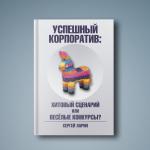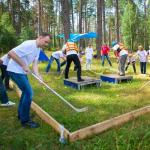Work program on human resource management strategy. Discipline: “Human resource management. General information about the course
MINISTRY OF EDUCATION AND SCIENCE
RUSSIAN FEDERATION
Saratov State University named after N.G. Chernyshevsky
Faculty of Economics
APPROVE
___________________________
"__" __________________ 20__
Work program of the discipline
Control by human resourses
Direction of training
080200.62- "Management"
Training Profile
Organization management
Qualification (degree) of the graduate
Bachelor
Form of study
full-time
1. The goals of mastering the discipline
Human Resource Management - a discipline that studies a complex system that includes interconnected and interdependent subsystems for the creation, use and development of an organization's human resources
Objects studies are:
Human resources of the organization in their integral connection with the human resources of society
Subject course studies are:
Relations developing at the micro level of the economy regarding the definition of needs, formation, organization, development, evaluation and motivation of the organization's human resources;
Goals studying the discipline - to form knowledge and ideas, skills about managing the formation of human resources for the organization and their effective use, creating conditions for maximizing the abilities of employees and achieving the goals of the organization.
tasks Human resource management courses are to gain knowledge and skills in the following aspects:
analysis of supply and demand in the labor market;
forecasting and planning the need for employees;
attraction, selection and selection of personnel;
adaptation of newly arrived workers;
improving the efficiency of human resources use;
improving the quality of work of employees;
improving the quality of the organization as a whole;
increase in the standard of living of workers;
improvement of motivation systems;
2. The place of the discipline in the structure of the BEP of the bachelor's degree
The discipline "Human Resource Management" is a discipline of the professional cycle and provides for the use of knowledge and skills acquired by students in the study of such courses as "Economics", "Microeconomics", "Marketing", "Management Theory" and others. The knowledge and skills gained in the study of the discipline "Human Resource Management" are the basis for studying the courses " Innovation management”, “Quality Management”, “Marketing Communications”.
3 Competences of the student, formed as a result of mastering the discipline (module) Human resource management .
The graduate must have the following professional competencies(PC):
able to use basic theories of motivation, leadership and power to solve managerial tasks(PC-4);
is able to effectively organize group work based on knowledge of the processes of group dynamics and the principles of team formation (PC-5);
owns various ways of resolving conflict situations (PC-6);
capable of analyzing and designing interpersonal, group and organizational communications(PC-7);
is able to assess the conditions and consequences of organizational and management decisions(PC-8);
is able to analyze the relationship between the functional strategies of companies in order to prepare balanced management decisions (PC-9);
is able to participate in the development of an organization's human resource management strategy, plan and implement activities aimed at its implementation (PC-13)
owns modern technologies of personnel management (PC-14);
takes into account aspects of corporate social responsibility in the development and implementation of the organization's strategy (PC-16)
information and analytical activities
has an idea about the economic way of thinking (PC-26);
knows how to apply quantitative and qualitative methods of analysis in making managerial decisions and build economic, financial, organizational and managerial models (PC-31);
able to audit human resources and carry out diagnostics organizational culture(PK-37);
As a result of mastering the discipline, the student must:
Know
Basic theories and concepts of how people interact in an organization, including issues of motivation, group dynamics, team building, communications, leadership and conflict management
Types of organizational culture and methods of its formation;
The role and place of personnel management in corporate governance and its relationship with the strategic objectives of the organization
Business processes in the field of personnel management and the role of line managers and personnel management specialists in them;
Be able to
-analyze the state and trends in the development of the labor market in terms of meeting the needs of the organization in human resources;
-assess the position of the organization in the labor market, develop a system of measures to improve the image of the organization as an employer;
-perform an audit of the organization's human resources, predict and determine the organization's need for personnel, determine effective ways to meet it;
- develop measures to attract and select new employees and programs for their adaptation
- develop employee training programs and evaluate their effectiveness;
-use various methods of evaluation and certification of employees and participate in their implementation;
- develop measures to motivate and stimulate the organization's personnel
- identify, analyze and rank the expectations of the organization's stakeholders in terms of the concept
-diagnose ethical issues in the organization and apply the main models for making ethical management decisions;
Own
Modern tools for human resource management
Methods of formation and maintenance of an ethical climate in the organization;
Business communication skills
Career planning methods
4. Structure and content of the discipline (module)
Human resource management The total labor intensity of the discipline is 4 credits 144 hours
Section of discipline | Semester | Semester week | Types of educational work, including independent work of students and labor intensity (in hours) | Forms of current progress control(per week of the semester) Forms of intermediate certification(by semesters) |
||||
independent |
||||||||
Topic 1. Human resources of organizations | ||||||||
Topic 2. Methodology of human resource management | homework |
|||||||
Topic 3. Human resource management system | Case presentations homework Test |
|||||||
Topic 4. Strategic human resource management | homework |
|||||||
Topic 5 Planning work with the organization's personnel | Results of solving problems and discussing situations |
|||||||
Topic 6. Technology and stages of personnel management in an organization | The results of the business game Presentation of plans and activities |
|||||||
Topic 7. Human resource development management technology | The results of the business game abstracts |
|||||||
Topic 8. Managing the behavior of the organization's personnel | Abstracts |
|||||||
Topic 9. Evaluation of the performance of the organization's personnel | control, test |
|||||||
Topic 1. Human resources of organizations disciplines. The purpose of the study disciplines- preparing students for managerial...
Work program for the discipline of conflict management
Document... __" __________________ 20__ WorkingprogramdisciplinesCONTROL CONFLICTS Direction of training... management", « Controlhumanresources" etc. 3. Competences of the student, formed as a result of mastering disciplines « Control ...
Annotations to the programs of disciplines (modules) humanitarian social and economic cycle basic part annotation to the work program of the discipline
ProgramStructure disciplinesControlhumanresources ... management KGU. Annotation to workingprogramdisciplines « Control land resources" Place disciplines in the structure of the main educational programs
Federal State Budgetary Educational Institution
higher professional education
"Voronezh State University of Architecture and Civil Engineering"
APPROVE
Director of the Institute of Economics,
management and information technologies
S.A. Barkalov
"____" _________________ 2015
WORKING PROGRAMM
disciplinesDirection of bachelor's training38. 03.02 "Management"
ProfileNot
Graduate QualificationBachelor
Normative period of study4/5 years
Form of studyfull-time/correspondence
"____" ______________ 2015, Protocol No. __
Head Department of Doctor of Technical Sciences, prof. _____________________ S.A. Barkalov
Voronezh 2015
GOALS AND OBJECTIVES OF THE DISCIPLINE
Purpose of the discipline
The tasks of mastering the discipline "Human Resource Management": student education theoretical foundations and practical skills needed to:
development of a strategy and concept of personnel management at the enterprise;
building functional and organizational structures for managing the organization and its personnel;
designing systems and technologies for personnel management;
solving problems related to the "human factor" based on modern knowledge about regularities, principles and methods of personnel management.
2. THE PLACE OF DISCIPLINE IN THE STRUCTURE OF OOP
The discipline "Human Resource Management" refers to the basic part of the professional cycle of disciplines curriculum.
The study of the discipline "Human Resource Management" requires the basic knowledge, skills and competencies of the student in the courses: "Theory of Management", "Sociology", "Psychology", "Conflict Management".
The discipline "Human Resource Management" is a precursor to the disciplines "Methods of making managerial decisions", " Strategic management”, “Corporate Social Responsibility”.
3. The list of planned learning outcomes in the discipline, correlated with the planned learning outcomes educational program
| results of mastering the educational program The process of studying the discipline "Fundamentals of personnel management" is aimed at the formation of the following competencies: | learning outcomes by discipline
|
| OK-1 knowledge of the basic values of world culture and readiness to rely on them in their personal and general cultural development | know:
|
| OK-5 possession of a culture of thinking, the ability to perceive, generalize and analyze information, set a goal and choose ways to achieve it | know:
|
| OK 7 willingness to cooperate with colleagues, work in a team | know:
negotiate own:
|
| OK-8 ability to find organizational and managerial decisions and willingness to bear responsibility for them | know:
|
| OK-12 awareness social significance his future profession, possessing high motivation to perform professional activities | know:
|
| OK-13 ability to analyze socially significant problems and processes | know:
|
| OK-21 own the basic methods of protection production staff and the population from the possible consequences of accidents, catastrophes, natural disasters | know:
|
| PC-1 knowledge of the main stages of the evolution of managerial thought | know:
|
| PC-2 the ability to design an organizational structure, to distribute powers and responsibilities based on their delegation | know:
|
| PC-3 readiness to develop procedures and control methods | know:
|
| PC-4 ability to use the basic theories of motivation, leadership and power to solve managerial problems | know:
|
| PC-5 the ability to effectively organize group work based on knowledge of the processes of group dynamics and the principles of team formation | know:
|
| PC-6 own various ways of resolving conflict situations | know:
|
| PC-7 ability to analyze and design interpersonal, group and organizational communications | know:
|
| PC-8 ability to assess the conditions and consequences of organizational and managerial decisions | know:
|
| PC-9 the ability to analyze the relationship between the functional strategies of companies in order to prepare balanced management decisions | know:
|
| PC-14 own modern technologies of personnel management | know:
|
| PC-17 willingness to participate in the implementation of the program of organizational changes, the ability to overcome local resistance to change | know:
|
| PC-25 familiarity with the basics of intercultural relations in management, the ability to effectively perform their functions in an intercultural environment | know:
|
| PC-37 ability to audit human resources and diagnose organizational culture | know:
|
4. VOLUME OF DISCIPLINE AND TYPES OF EDUCATIONAL WORK
The total complexity of the discipline "Human Resource Management" is 4 credit units.
| Type of study work | Total hours | Semesters/courses |
||
| 6 /4 | ||||
| Classroom lessons (total), including: | 54 /18 | 54 /18 | ||
| Lectures | 36/6 | 36/6 | ||
| Practical exercises (PZ) | 18/12 | 18/12 | ||
| Laboratory works(LR) | -/- | -/- | ||
| Independent work (total), including: | 54 /117 | 54 /117 | ||
| Course work | -/- | -/- | ||
| Test | -/- | -/- | ||
| Type of intermediate certification- exam | 36 /9 | 36 /9 | ||
| General labor intensity | hour | 144 /144 | 144 /144 | |
| credit units | 4 /4 | 4 /4 | ||
Note : hereinafter, the numerator is full-time / the denominator is part-time education.
5. the content of the discipline,
structured by topics (sections) indicating
the number of academic hours assigned to them and
types of training sessions
5.1. Educational and thematic plan
| № p/n | Name of sections and topics disciplines | Lekts. | Prakt. zan. | Lab. zan. | SRS | Total hour. |
| Section 1. Fundamentals of Modern Philosophy and Concepts of Personnel Management |
||||||
| 1.1 | The personnel of the enterprise as an object of management. (OK-12) | 2/0,5 | 1/1 | -/- | 2/8 | 5/9,5 |
| 1.2 | HR strategy and personnel policy of the organization (OK-1, OK-5, OK-12, PC-17) | 2/- | 1/- | -/- | 4/8 | 7/8 |
| 1.3 | Fundamentals of the development and implementation of the concept of personnel management (OK-13, PC-1, PC-17) | 2/0,5 | 2/1 | -/- | 4/8 | 8/9,5 |
| Section 2. Methods and technologies of personnel management |
||||||
| 2.1. | Selection and recruitment technologies. (OK-21, PK-2, PK-14) | 4/0,5 | 2/2 | -/- | 4/8 | 10/10,5 |
| 2.2 | Development and training of personnel. (PK-14) | 2/0,5 | 2/- | -/- | 2/7 | 6/7,5 |
| 2.3 | Principles and bases for the formation of a system of motivation and incentives for personnel. (OK-7, PC-4, PC-14) | 4/0,5 | 2/2 | -/- | 4/7 | 10/9,5 |
| 2.4 | Technologies for assessing various categories of personnel. (PK-14) | 4/0,5 | 2/- | -/- | 2/7 | 8/7,5 |
| 2.5 | Formation of a corporate culture and a system of internal communications in the company (OK-1, OK-7, PC-5, PC-6, PC-7, PC-14, PC-25) | 2/- | -/- | -/- | 2/8 | 4/8 |
| 2.6 | Procedures for moving and adaptation of personnel. (OK-21, PK-2, PK-6, PK-14) | 2/0,5 | -/- | -/- | 2/8 | 4/8,5 |
| section 3. Organizational design of the personnel management system |
||||||
| 3.1 | The place of the personnel management system in the structure of the organization. (OK-7, PC-2, PC-5, PC-9, PC-17) | 2/- | 1/- | -/- | 2/8 | 5/8 |
| 3.2 | Organizational structure personnel management services. (OK-8, PC-2, PC-8) | 2/0,5 | 1/2 | -/- | 2/8 | 5/10,5 |
| section 4. Regulatory and documentary support of personnel management processes |
||||||
| 4.1 | Legal support of the personnel management system (PC-14) | 2/0,5 | -/- | -/- | 2/8 | 4/8,5 |
| 4.2 | Documentation support personnel management processes (PC-14) | 2/0,5 | 2/2 | -/- | 2/8 | 6/10,5 |
| section 5. Evaluation of the effectiveness of the personnel management system. |
||||||
| 5.1 | The system of performance indicators for personnel management. (OK-8, PC-3, PC-8) | 2/0,5 | 2/2 | -/- | 2/8 | 6/10,5 |
| 5.2 | Fundamentals of auditing and personnel controlling. (PK-3, PK-8) | 2/0,5 | -/- | -/- | 2/8 | 4/8,5 |
| Exam | 36/9 | |||||
Federal State Budgetary Educational Institution
higher professional education
"Russian Academy of National Economy and Public Administration
under the President of the Russian Federation"
SOUTH-RUSSIAN INSTITUTE OF MANAGEMENT
Management department
Department of Management
Educational and methodological complex of the discipline "human resource management"
Direction 38.03.02 "Management"
Profiles "Project Management", "Financial Management"
Qualification Bachelor
Form of study
full-time, part-time education
Rostov-on-Don - 2015
South Russian Institute of Management RanHiGs
Department of Management
Novikov V.M., Baeva V.D.
Human resource management: Educational method. complex. Rostov n / a: Publishing House of YURIU RANEPA, 2015. - 77 p.
The educational and methodological complex was developed in accordance with the requirements of the Federal State Educational Standard of the Higher Professional Education, taking into account the recommendations and the BEP of the Higher Professional Education.
Designed for the preparation of bachelors in the direction: 38.03.02 "Management" (for full-time and part-time forms of study), profile "Financial Management", "Project Management".
Printed by the decision of the department.
Minutes No. dated "_____" ______________ 2015
|
General information about the course …………………………………………………………………… | |
|
Curriculum plan………………………………………………………………… | |
|
Course program…………………………………………………………………………. | |
|
Seminars…………………………………………………………………… | |
|
Questions for the exam………………………………………………………………………… | |
|
Topics of abstracts………………………………….………………………………………. | |
|
Glossary…………………………………………………………………………………. | |
General information about the course
The academic discipline "Human Resource Management" is one of the compulsory disciplines of the professional cycle of the curriculum for the preparation of bachelors in the direction of "Management". Continuous change in external environment, growing competition in all resource markets, the modernization of the Russian economy, the globalization of society, the rapid development of scientific and technological progress, the qualitative complication and differentiation of labor, the growth of its intellectual component in total social production, impose more stringent requirements on modern managers of any link in the managerial hierarchy. With regard to line and functional managers in the structural divisions of the organization, their ability not only to make competent management decisions, but also to influence their subordinates, taking into account the realization of the interests of all participants in industrial relations, becomes relevant. As applied to human resource managers, competence effective leadership employees is decisive and is distinguished by a strategic focus on personnel policy organizations.
object the studied course is the human resource management system in the organization.
Subject course is the effectiveness of human resource management from the standpoint of achieving the goals of management and the team, as well as the relationship that arises between owners, management and subordinates.
Cspruce disciplines - the study by students of the principles, functions, methods of human resource management, the analysis of the concepts of human resource management, as well as the formation of skills for effectively influencing personnel in modern organizations, taking into account the coordination of the interests of management and the team in the conditions of real Russian practice.
In the process of studying the discipline, tasks:
Formation of complex ideas about evolution and current trends human resource management;
Identification of differences between human resource management and personnel management;
Studying the main elements, goals and functions of the human resource management system;
Analysis of the role of the human resource management function in achieving organizational goals;
Consideration of human resource management practices;
Formation of ideas about the principles of budgeting the human resource management system in modern organizations;
Substantiation of modern methods for evaluating the effectiveness of the human resource management system;
Identification of the principles for the formation of a human resource management strategy and modern approaches to strategic management by human resourses;
Analysis of the concept and practice of personnel knowledge and competence management;
Study of the process of formation of human resources in the organization;
Research of technologies for the effective use of human resources, methods of stimulation and motivation;
Identification of the role of corporate development of human resources in achieving organizational objectives;
Analysis of modern approaches to managing the career of employees and the formation of a personnel reserve;
Formation of ideas about modern labor relations in Russian organizations;
Analysis of health and safety policy in modern organizations.
Requirements for the level of mastering the content of the discipline.
The process of studying the discipline is aimed at the formation of the following competencies:
Knowledge of the main stages of the evolution of managerial thought (PC-1),
The ability to design a management structure, to distribute powers and responsibilities based on their delegation (PC-2),
Ability to use the basic theories of motivation, leadership and power to solve managerial problems (PC-4).
|
Competence |
Code according to GEF / PLO |
Outcome indicators |
Forms and methods of teaching that contribute to the formation and development of competence |
|
knowledge of the main stages of the evolution of managerial thought |
Essence, goals, functions and organizational structure of the personnel management system; Technologies for recruitment, selection, reception and placement of personnel; |
Solution of practical problems; Completion of tasks on the topics of the program independently. |
|
|
Develop measures to attract and select new employees and implement programs for their adaptation; Develop and implement measures to improve the organization of personnel work; |
|||
|
Modern technologies personnel management of the organization (hiring, selection, reception and placement of personnel; |
|||
|
the ability to design a management structure, to carry out the distribution of powers and responsibilities on the basis of their delegation |
Fundamentals of career guidance and labor adaptation of personnel; The essence and principles of the organization of labor of personnel, the release of personnel; Technologies for managing the social development of personnel; The specifics of the organization of personnel training; |
Attending lectures; Preparation for seminars; Participation in the discussion; |
|
|
Use various methods of current business assessment (including appraisal) of personnel; Develop and implement programs professional development personnel and evaluate their effectiveness; |
|||
|
Modern technologies for managing the training and development of personnel; Skills in developing procedures, methods for monitoring and evaluating the activities of personnel. |
|||
|
ability to use the main theories of motivation, leadership and power to solve managerial problems |
The essence of the technology of the current business assessment of personnel, incl. personnel certification; Fundamentals of business career management and service and professional promotion of personnel; Technologies of management of personnel innovations. |
Attending lectures; Preparation for seminars; Preparation of abstracts; Participation in the discussion; Completion of tasks on the topics of the program independently. |
|
|
Develop and implement professional development programs for personnel and evaluate their effectiveness; Develop measures to improve career management and professional promotion of personnel and participate in their implementation. |
|||
|
Modern technologies for managing the training and development of personnel; Skills in developing procedures, methods for monitoring and evaluating the activities of personnel. |
Methodology the study of the discipline is built on the consistent study of it by lecturing, conducting seminars, control works and independent work of students in certain areas.
aim conducting seminars and practical classes is to consolidate the knowledge, skills and abilities gained in lectures and in the process of independent work of students with scientific and educational literature.
Independent work students is aimed at consolidating and deepening the acquired knowledge and skills, preparing for upcoming classes and final control, as well as forming a culture of mental work and independence in the search and acquisition of new knowledge. It must be systematic and continuous.
An intermediate form of knowledge control is a test. The final form of student knowledge control - exam .
"one. OBJECTIVES OF MASTERING THE DISCIPLINE "Human Resource Management" is a scientific discipline that studies the phenomenon of human resources within the framework of ... "
ANNOTATION
WORK PROGRAM DISCIPLINE
"HUMAN RESOURCES MANAGEMENT"
Direction of training - 38.03.01 Economics
Training profile - Economics of the organization (enterprise)
Qualification (degree) - bachelor
Form of education - full-time, part-time, part-time
The program is implemented by the Department of Economics and Management
1. OBJECTIVES OF MASTERING THE DISCIPLINE
"Human resource management" is a scientific discipline that studies the phenomenon of human resources within certain organizational structures and its impact on performance.The course is aimed at studying the practical and theoretical provisions of interactive methods. In addition to general familiarization with the problem of conducting training sessions, the course pursues the goals of personal and professional improvement of future economists-practitioners, as well as acquiring the knowledge and skills necessary for them to conduct effective organizational consulting and self-management of active learning groups, as well as for the implementation of psycho-correction of personnel in the organization .
The course program is designed taking into account the needs modern business, management psychology and social support employees of enterprises.
The course program is mainly aimed at conducting practical classes and mini-lectures on the development of organizational development technologies that provide modern approach to managing change faced by organizations and to developing human resources.
The purpose of the program is to develop skills and develop skills in the field of personnel management, the formation of basic ideas for recruiting, coaching and coaching - consulting, as well as in-depth knowledge and skills acquisition in a particular area, including innovative mechanisms in practice.
Program objectives:
Describe the basic technology of mechanisms in the field of personnel management;
Highlight the purpose of the HR service;
Outline the main aspects of personnel policy;
Show students how HR consultants work;
Show listeners buisness process selection and methods of work of the recruiter;
Inform participants about the methods of work in the areas of recruiting, coaching, coaching;
To teach the methods of work of external and internal HR consultants;
Build a “consultant-client” interaction model, as seen by its internal HR manager and manager (client, customer), as well as by the agency and consultant;
Build recruiting skills
Teach to develop regulations and methodological materials for the implementation of the recruitment process;
Help to acquire the skills of conducting telephone interviews and interviews;
Introduce students to test methods and teach how to determine the need for 11.
application;
To indicate the importance of planning and forecasting the need for personnel;
Inform participants about the importance of the onboarding process as the final stage of selection;
To form the skills of planning and evaluating the results of their own activities;
To form skills in the field of coaching;
Define the concept of organizing and conducting trainings;
To teach how to write scripts for training programs for any request;
Introduce students to the method of counseling - coaching;
Show students how coaching consultants work;
Learn to develop your own methodological programs and exercises, both in coaching and coaching.
Determine the essence and content of innovative mechanisms in recruiter directions, 21.
professional trainer, coach consultant;
Demonstrate certain approaches, as well as roles in innovation mechanisms for 22.
these areas;
Show the features of the corporate culture at work and the use of innovative mechanisms;
Introduce professional adaptation and staff orientation;
Show the importance of work with staff motivation;
To teach the methods of work of psychologists and managers with the stress of their clients and subordinates;
Teach methods of prevention and leveling stressful situations;
To teach to identify the key competencies of the position and evaluation criteria;
Show the audience the place and role of the Assessment Center method in the personnel assessment system 29.
companies;
Help to acquire the skills of an Assessment Center observer.
2. THE PLACE OF DISCIPLINE IN THE STRUCTURE OF THE BASIC EDUCATIONAL
HIGHER PROFESSIONAL EDUCATION PROGRAMS
The complexity of the discipline is 4 credit units (144 hours). Classroom activities- 54 hours, of which lectures - 18 hours, seminars - 36 hours, including in active / interactive form - 12 hours. For independent work - 36 hours.
The discipline "Human Resource Management" is studied by full-time students of the direction "Economics" in the 3rd semester of the 2nd year, by correspondence students - in the 3rd and 4th semesters of the 2nd year. "Human Resource Management" is a part of the disciplines of the variable part of the professional cycle when teaching bachelors of economics. Together with next training courses general scientific profile "Human Resource Management"
forms the basis of the fundamental theoretical training of highly qualified specialists.
The discipline "Human Resource Management" is closely interconnected with such disciplines as "Fundamentals of Management". The knowledge gained in the study of this discipline will be further used by students in the development of the disciplines "Management", "Organizational Behavior", the implementation of graduation projects. The teaching of the course uses the basic concepts introduced in the above subjects. Students in the learning process acquire skills in the field of HR. Work in the field of personnel management involves intensive and intense communication, skills in the field of innovative mechanisms allow you to psychologically safely manage the processes of interaction with personnel.
The main focus of the program is on theoretical and practical problems in the field of personnel management. The theoretical part of this program includes an overview of psychological schools and theories that offer various methodological foundations for work in the areas of recruiting, coaching and coaching.
Education is innovative, using technical means in training, methodological support, classes are held in the form of seminars, interactive and business games, lectures, training sessions, using the workshop method, master classes conducted by external experts in the field of HR, etc.
Thus, "Human Resource Management" has not only theoretical, but also great practical value. Because of this, the assimilation of its provisions is an important task for students studying in the bachelor's degree program "Economists" at the Moscow Humanitarian Institute named after E.R. Dashkova.
The study of this discipline ends with an exam.
3. STUDENT COMPETENCES,
FORMED AS A RESULT OF DISCIPLINE MASTERING
Professional competencies:
PC-11 ability to organize activities small group created for the implementation of a specific economic project;
PC-13 the ability to critically evaluate the proposed options for management decisions and develop and justify proposals for their improvement, taking into account the criteria of socio-economic efficiency, risks and possible socio-economic consequences.
4. REQUIREMENTS FOR EDUCATIONAL OUTCOMES PRODUCED
DISCIPLINE
As a result of mastering the discipline "human resource management", the student must:
Know:
competencies of an HR consultant in a modern business process;
organization of the process of external consulting;
methods of interaction with external and internal top management;
methods of work of the consultant: assessment, development, individual and group;
legal and economic aspects of activity.
features of the Assessment Center method in the personnel assessment system;
organization of the Assessment Center process;
features of interaction with assessment participants (observed);
features of the observer's work: observation, processing of the collected information, compilation and writing of an observation report;
ways to apply the results obtained during the Assessment Center.
features of the coaching market in Russia and abroad;
competencies of a coaching consultant;
organizing the process of coaching sessions;
methods of interaction and work with the client;
basics of stress management (types, forms, mechanisms, factors, reactions, coping strategies);
competencies of a specialist working with stress;
organization of the process of working with stress;
the essence of the theoretical and methodological foundations of training work;
methods of training work: their content and features of application;
technologies for conducting trainings in various areas of practical psychology;
competencies of an HR manager in a modern business process;
organization of the external selection process;
search and attraction of suitable candidates;
personnel selection methods;
control and direction of the interview;
personnel assessment methods;
teaching methods;
recruiter competencies, methods for compiling a position profile, methods for adapting a beginner,
Own:
features of the process of external consulting;
a variety of consulting services, navigate the advantages of each of them;
the importance of interaction and building relationships with the customer;
the role of the Assessment Center method for the employees of the company and the organization itself;
the importance of developing a competency model with the customer of the process;
the role of objective and impartial observation during the Assessment Center;
features of the coaching process;
variety of coaching services;
the importance of interacting and building relationships with the client;
the need for a systematic and non-judgmental view of the client's request;
features of stress phenomena and their significance;
variety of stress reactions and causes of behavior of people under stress;
the importance of a systematic and interdisciplinary approach to the problem of stress;
the importance of resolving and preventing stressful situations in the organization.
the nature of the training activity;
the importance of the trainer in working with the group;
organization of the learning process;
about recruitment in general (goals, tasks, functions), distinctive features internal and external recruitment,
Have skills:
objective (independent) and systemic thinking;
purposefulness, openness to new things, courage;
operational work with a large and non-structural flow of information;
building maps, diagrams on paper and digital media using computer programs;
building personal interaction with people of different gender, professional and social status;
introduction of innovations and innovative trends in the current organizational policy.
objective and impartial observation of the process;
compiling personal and summary observation reports on the observed participant of the Assessment Center;
consideration of the client's request in the system and holistically.
system study of the stress algorithm "input - output", designing training programs;
technology of training and group dynamics;
professional identity and personal style of the coach;
collection of preliminary information about candidates;
active listening;
assessment of non-verbal behavior;
organization of the process of training the system of evaluation of labor productivity.
development of an adaptation program and its implementation, evaluation of the results of passing probationary period, evaluation of the results of their own activities.
Topic 1. Peculiarities of HR and consulting business HR strategy Topic 2. BSC and KPI. The main stages of recruitment Topic 3. Organization of the process of external and internal recruitment. Systems approach in recruitment Theme 4. Ethics business communication HR manager: legal and psychological aspect Topic 5. Methods for assessing personnel. Assessment center in the personnel assessment system Theme 6. Planning and evaluation of the results of their own activities. Features of the regulation of organizational conflict Topic 7. Prevention of stress in the organization. Psychocorrection and prevention of PEP Topic 8. Psychological foundations of training programs. Fundamentals of designing training programs Topic 9. Features of planning and organizing training programs depending on the goals and objectives. Features and methods of working with group dynamics. Group leader personalityTopic 1. The modern concept of human resource management
Human resource of modern organizations, its economic and social value. Staff. Distinctive features of personnel and human resources. The difference between human resources and other economic resources. Personnel. Labor as a factor of production. Labor potential. Personnel potential. Work force. Human Resources. Human capital. The human factor that determines structural shifts in the economic strategy of modern organizations.
Human resource management. Personnel Management. The difference between personnel management and human resource management. Economic feasibility of human resource management as a factor in increasing the economic efficiency of the organization. The effectiveness of human capital.
The evolution of the employee management process. Technocratic concept (personnel management). The concept of personnel management. The concept of human resource management.
Modern trends in human resource management: talent management; increasing flexibility in working with personnel; strategic orientation of work with personnel; effective organization work with personnel; individual approach; measurability of work with personnel; conveying values and meaning; leadership development; maintaining the productivity of an aging workforce.
Personnel classification. Production personnel. Management staff. Personnel groups: functional management specialists, engineers, employees.
Topic 2. Human resource management system: its goals and functions
Human resource management system. System approach in human resource management. The goal of human resource management is the rational formation, use and development of the labor potential of employees. Economic and social goals of human resource management.
Functions of human resource management. Formation of human resources. Use of human resources. Development of human resources. Retention of human resources.
The role and place of the human resource management service in the enterprise management structure. The tasks of the human resource management service in the implementation of the mission of the organization.
functional division of labor. Formation of the organizational structure of the human resource management service. Personnel, technical and legal support of the human resource management system. Organizational structure of the human resource management service.
Personnel optimization. Personnel optimization technologies: outsourcing, outstaffing, personnel leasing, remote form of labor organization, decentralization of functions, informatization of management functions.
Job Description for Human Resources Manager. General qualification requirements for human resource managers. The specific responsibilities of a human resource manager, their interaction with functional and line managers.
Fundamentals of the formation of the budget of the human resource management system in modern organizations.
Criteria for the effectiveness of the work of a modern human resource management service. Methods for assessing the effectiveness of the human resource management system: expert assessment; assessment of return on investment in personnel; benchmarking method; J. Philips technique; D. Ulrich's technique.






